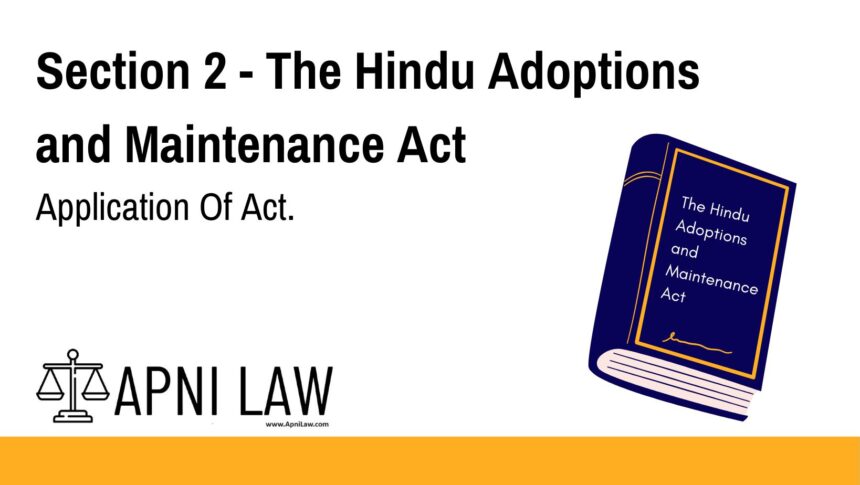Code: Section 2 – Application of Act
(1) This Act applies—
(a) to any person who is a Hindu by religion in any of its forms or developments, including a Virashaiva, a Lingayat or a follower of the Brahmo, Prarthana or Arya Samaj;
(b) to any person who is a Buddhist, Jaina or Sikh by religion; and
(c) to any other person who is not a Muslim, Christian, Parsi or Jew by religion, unless it is proved that any such person would not have been governed by Hindu law or by any custom or usage as part of that law in respect of any of the matters dealt with herein if this Act had not been passed.
Explanation.—The following persons are Hindus, Buddhists, Jainas or Sikhs by religion, as the case may be:
(a) any child, legitimate or illegitimate, both of whose parents are Hindus, Buddhists, Jainas or Sikhs by religion;
(b) any child, legitimate or illegitimate, one of whose parents is a Hindu, Buddhist, Jaina or Sikh by religion and who is brought up as a member of the tribe, community, group or family to which such parent belongs or belonged;
(bb) any child, legitimate or illegitimate, who has been abandoned both by his father and mother or whose parentage is not known and who in either case is brought up as a Hindu, Buddhist, Jaina or Sikh; and
(c) any person who is a convert or re-convert to the Hindu, Buddhist, Jaina or Sikh religion.
(2) Notwithstanding anything contained in sub-section (1), nothing contained in this Act shall apply to the members of any Scheduled Tribe within the meaning of clause (25) of article 366 of the Constitution unless the Central Government, by notification in the Official Gazette, otherwise directs.
(3) The expression “Hindu” in any portion of this Act shall be construed as if it included a person who, though not a Hindu by religion, is, nevertheless, a person to whom this Act applies by virtue of the provisions contained in this section.
Explanation of Section 2 – Application of Act
Section 2 of the Hindu Adoptions and Maintenance Act, 1956 defines the categories of persons to whom the Act applies. It includes not only traditional Hindus but also Buddhists, Jainas, and Sikhs. Additionally, it provides for certain non-Hindus who may be governed by Hindu law due to customs or upbringing.
Key Inclusions:
- Applies to Hindus in all denominations, including sects like Virashaivas and followers of Brahmo, Arya Samaj, and Prarthana Samaj.
- Covers Buddhists, Jainas, and Sikhs by religion.
- Applies to children (legitimate or illegitimate) raised in Hindu, Buddhist, Jaina, or Sikh traditions—even if their parentage is unknown.
- Converts and reconverts to Hinduism, Buddhism, Jainism, or Sikhism are covered.
- Non-Hindus (e.g., Christians, Muslims) are not covered unless it is established that they would have been governed by Hindu law before the enactment of this Act.
Important Exceptions:
- Members of Scheduled Tribes are excluded unless the Central Government specifically brings them under the purview of the Act via notification.
Interpretation Clause:
- The term “Hindu” used throughout the Act includes all persons to whom the Act applies under this section, regardless of their formal religious identification.
Illustration
Example 1: Child of Mixed Parentage
A child whose mother is Hindu and father is of an unknown religion but who is raised within a Hindu household will fall under the purview of this Act, as per clause (b) of the Explanation.
Example 2: Convert to Hinduism
An individual born to Christian parents but who later formally converts to Hinduism will be governed by this Act as per clause (c) of the Explanation.
Example 3: Scheduled Tribe Exception
A member of a Scheduled Tribe as defined under Article 366(25) of the Constitution is not automatically governed by this Act unless a notification is issued by the Central Government.
Common Questions and Answers
1. Does the Act only apply to Hindus?
No, it also applies to Buddhists, Jainas, Sikhs, and certain persons who are not Muslims, Christians, Parsis, or Jews, provided they are governed by Hindu law by custom or usage.
2. What about children of mixed religious backgrounds?
If one parent is Hindu, Buddhist, Jaina, or Sikh and the child is raised in that tradition, the child is covered under this Act.
3. Are converts covered?
Yes, any person who converts or reconverts to the Hindu, Buddhist, Jaina, or Sikh religion is governed by this Act.
4. Does it apply to Scheduled Tribes?
No, unless the Central Government issues a notification in the Official Gazette applying the Act to them.
Conclusion
Section 2 of the Hindu Adoptions and Maintenance Act, 1956 establishes the scope of the Act’s applicability. It inclusively defines who is considered a “Hindu” for the purposes of the Act and sets out clear boundaries and exceptions. Understanding this section is crucial for determining who can legally adopt or claim maintenance under the Act.
For detailed interpretations of additional sections, visit the legal resource hub at ApniLaw.








